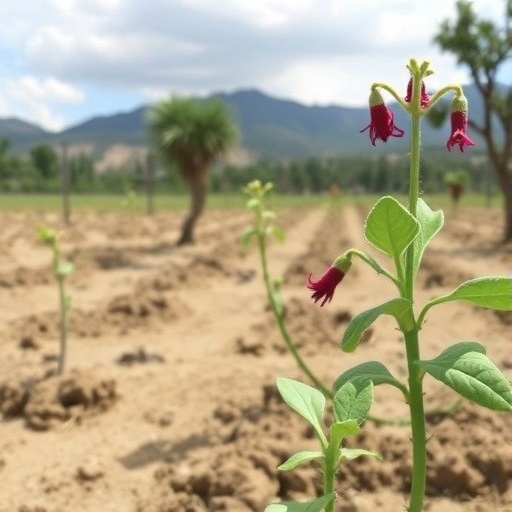In a groundbreaking study, researchers have embarked on an extensive exploration of the SnRK gene family, specifically within the species Caragana korshinskii, a resilient shrub native to arid environments. This research addresses critical questions about how certain genes contribute to the plant’s ability to cope with extreme conditions such as drought and nutrient deficiency. As climate change makes droughts more frequent and severe, understanding the genetic foundations of resilience in plants becomes paramount for agricultural productivity and ecological stability.
The focus of this study is the SnRK (SNF1-related protein kinase) gene family, which plays a vital role in plants’ response to environmental stresses. These kinases are implicated in various physiological processes, including energy regulation, stress responses, and developmental pathways. By conducting a comprehensive genome-wide analysis, the researchers sought to catalog and characterize the SnRK gene family in Caragana korshinskii, thereby providing a crucial framework for understanding its adaptive mechanisms.
Through high-throughput sequencing and bioinformatics tools, the team identified several SnRK genes and analyzed their sequences to determine their evolutionary relationships. The research revealed the presence of various clades within the SnRK family, each possibly playing distinct roles in the plant’s stress response. This delineation offers insights into the evolutionary pressures that have shaped these genes, hinting at their functional diversification in response to environmental challenges.
To gauge the expression levels of these SnRK genes under drought conditions and nitrogen deposition, the researchers employed quantitative PCR techniques. The results indicated that specific SnRK genes demonstrate differential expression patterns in response to these stressors. Notably, certain genes showed increased expression when subjected to drought, suggesting their critical involvement in adaptive mechanisms that mitigate water stress.
The findings also highlighted the intricate regulatory networks that govern gene expression in response to environmental stimuli. Understanding these networks is fundamental for unraveling how plants strategically allocate resources and activate survival strategies during periods of stress. The dynamic interplay between SnRK genes and other signaling molecules under drought conditions underscores the complexity of plant responses to abiotic stresses.
Additionally, the study investigated the impact of nitrogen deposition on SnRK gene expression. Nitrogen is a crucial nutrient for plant growth, yet excessive nitrogen can also lead to detrimental effects on plant health. The researchers found that nitrogen availability influenced the expression of certain SnRK genes, suggesting a nuanced relationship between nutrient availability and stress response pathways.
Implications of this research extend beyond basic science, with potential applications in agriculture and plant breeding. By manipulating SnRK gene expression, scientists may enhance the resistance of crops to drought and optimize nutrient use efficiency. As agricultural practices strive towards sustainability, insights gained from Caragana korshinskii could inform breeding programs aimed at developing climate-resilient crop varieties.
Moreover, the study’s results set the stage for future research that could involve the targeted editing of SnRK genes using CRISPR technology. Such advancements could revolutionize how we approach plant breeding and agriculture, enabling the development of varieties that can thrive under adverse conditions. The prospect of creating hardier crops is particularly critical as global food security becomes increasingly threatened by climate change.
As the research community continues to navigate the challenges posed by a changing climate, findings like those from Cheng et al. serve as a beacon of hope. Their work contributes significantly to our understanding of plant resilience, encouraging further exploration of genetic strategies that could enhance plant survival in challenging environments. This research exemplifies the complex relationship between genetics, environmental stressors, and the broader agricultural landscape.
The thorough investigation of the SnRK gene family in Caragana korshinskii resonates within the scientific community as it opens new avenues for research. Gene expression profiling in response to both drought and nutrient availability delineated in this study not only enhances our comprehension of a particular species but also has broader implications for plant biology as a whole. The intersection of genomics and agriculture underscores the importance of such foundational studies in addressing future food security challenges.
In conclusion, the work presented by Cheng and colleagues offers a profound understanding of the genetic basis of stress resilience in Caragana korshinskii. By elucidating the roles of SnRK genes in drought and nitrogen response, this research paves the way for innovations in agricultural biotechnology aimed at fostering sustainable practices. We stand on the brink of a new era in plant science, where insights from fundamental research can lead to tangible solutions for pressing global challenges.
As the research progresses, further studies are anticipated to validate these findings in field conditions, bringing laboratory insights into real-world applications. This transition from bench to field is crucial for transforming genomic knowledge into practical solutions that can benefit farmers and enhance food systems globally. The implications are far-reaching, and the excitement surrounding this research is palpable as scientists look to apply the lessons learned from Caragana korshinskii to crops that feed the world.
In summary, the deep dive into the SnRK gene family of Caragana korshinskii not only illuminates the genetic underpinnings of drought resistance but also acts as a catalyst for advancing agricultural research. The journey from genomic data to implementing breeding strategies holds the promise of a more resilient agricultural future amidst the inevitable challenges posed by climate change.
Subject of Research: SnRK gene family in Caragana korshinskii and its role in drought and nitrogen response.
Article Title: Genome-wide analysis of the SnRK gene family in Caragana Korshinskii and their expression profiling under drought and nitrogen deposition.
Article References:
Cheng, S., Hao, L., Sun, J. et al. Genome-wide analysis of the SnRK gene family in Caragana Korshinskii and their expression profiling under drought and nitrogen deposition.
BMC Genomics 26, 838 (2025). https://doi.org/10.1186/s12864-025-12046-2
Image Credits: AI Generated
DOI:
Keywords: SnRK gene family, Caragana korshinskii, drought, nitrogen deposition, gene expression, plant resilience, agricultural biotechnology.




